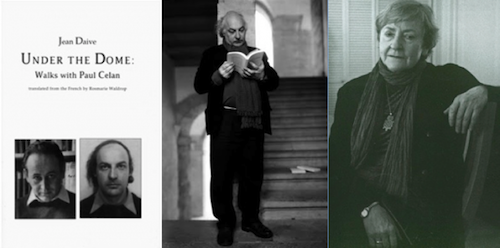Gail Scott Looks at Rosmarie Waldrop's Translation of Jean Daive's Walks with Paul Celan
Just published and very much worth a read over at Jacket2: Gail Scott reviews the 2009 book by Jean Daive, Under The Dome: Walks with Paul Celan, a discussion, she says, that "must start with admiration for the work of the translator. For the French poet Daive’s chronicle of Paris walks with the great German-language poet Celan is a treatise on the question of translation, operating at precisely the point where translation meets poetry. That is, at the edge of the incommunicable." Of course, that translator is Rosmarie Waldrop. And Scott should know something about Paris walks! She first read Waldrop through her Key Into the Language of America, Waldrop's "poetic reinscription of a colonial document [by Roger Williams] about an essentially missing indigenous language in the Rhode Island region," but in this book, "Waldrop is acting in the more usual translator mode of directly channeling into English a French-language story involving a German-Jewish poet refugee from a mid-twentieth-century European genocide." Scott continues:
But this important translation excavates what Benjamin called the poetic essential of the text by deploying language that very quietly, unobtrusively, has the effect of metonymically underscoring the layers of transliteration already present in Jean Daive’s recounting of his 1965–1970 Paris walks with the great Celan. Written twenty years after the fact, in prose fragments that often recall, in tone, the discursive language acts of nouvelle vague cinema, the translation is in turn taking place a couple of decades after the text is written. But time cannot alter the longing, in language, for connection. I find myself almost physically experiencing the actual sense of continual transition between systems of thinking, which is, indeed, the poetic secret of the text and of Waldrop’s adroit translation. Precisely because the effect is cumulative, is a metonymic progression, it is difficult to provide an analysis in this space of how she accomplishes this task. Sometimes, it is with what seems to me an odd choice for an English rendering. Here is a tiny instance of that:
— There is a trap. There is a trap between Paul and me.
I might have been tempted, here, to reach a little more. The English “There is a trap between Paul and me” is odd. Speculating on the French version, which I have not seen, I might have said: “There is a serious complication with Paul.” But Waldrop, the poet, does not water the surface language for the sake of “message”; she takes it to the other extreme, and may, in so doing, reveal the text’s most profound measure.
THERE IS A TRAP:
If Daive’s memoir already suggests, with its semantic leaps, the “trap” of gaps or abysses experienced in conversations with Celan, the quite lovely prose fragments recounting those Paris walks also blur time. And the French poet’s refusal to make the slightest concession to the linear draw of prose releases the (non)meaning from the “trap” of that relationship. Like the donkey that Daive watches while writing the chronicle in a Greek Island café two decades later, Celan augments distance by remaining a static image that “does not let anything encroach …” Though he [the donkey!] “cries, he weeps, he brays,” what the chronicler Daive hears, in the untranslatable braying, is the anguish of the “still living mass fall into the sea, into the Seine.” The mass is Celan’s suiciding body. That the braying stands in for the poet in itself gives pause. A pause full of telling vectors about Daive’s take on the relationship. Celan is always leaving. That is, he is always disappearing into the obliquity of his own interior, reappearing seemingly with effort, with a certain pomp that may simply be the awkardness, again, of transiting syntax, so conversation seems performed:
— For it is said you shall translate on the seventh day.— In which passage of the Bible is this written?
— A passage in my head.
— Ah.
And Jean Daive, the acolyte, panting for acknowlegement, appreciation, suffers from this distance, yet in that inimitable French way of seeing things for what they are, knows himself how to keep an ironic distance. He notes how often Celan, as they take leave of each other in front of the older poet’s apartment building, suggests “with perfectly controlled embarrassment, (that) I don’t come up because the cleaning woman didn’t come today.” Daive insists over and over again on Celan’s reticence. Re: the wartime deportation of his parents, for example, which he dislikes talking about. Or, Celan citing a remembered poster: “The One Alone exists.”
Read the entire review here. Image courtesy of Jacket2.



